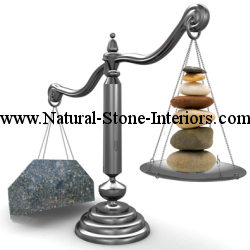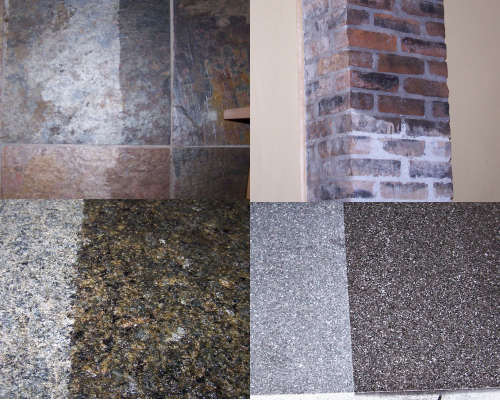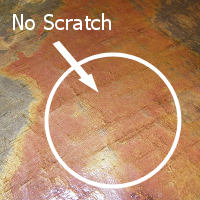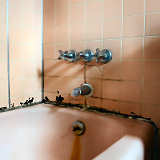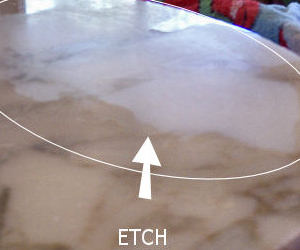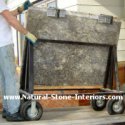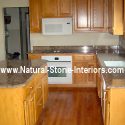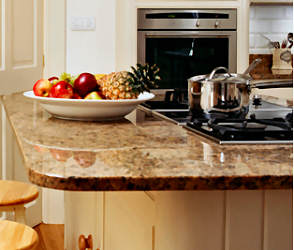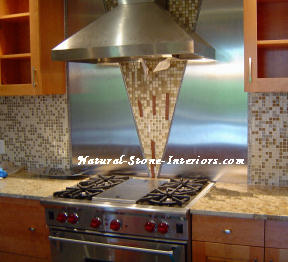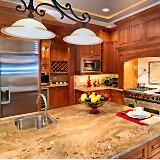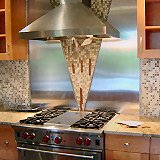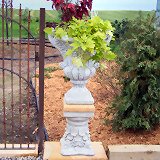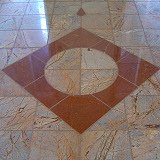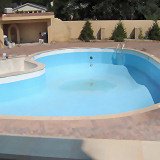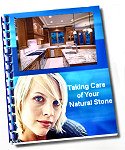Granite Countertop Hardness
Moh's Scale of Relative Hardness
The hardness of your granite countertop is largely dependent upon the hardness of the minerals that make up the stone.
In most granites, the primary minerals are quartz and feldspars.
The hardness of a mineral is often defined by using Moh's Scale of Relative Hardness.
This scale was developed in 1822 by Friedrich Moh to measure the hardness of minerals.
The idea behind Moh's Scale was that minerals or substances with a lower hardness could not scratch minerals or substances with a greater
hardness.
Moh's Scale of Hardness
- Talc
This is the softest of the minerals and can easily be scratched with a fingernail. It is used in paint, paper,and talcum powder.
Soapstone consists mainly of talc.
- Gypsum
This mineral can barely be scratched with a fingernail. It is used for plaster of paris, wallboard, and interior plaster. Alabaster
is a fine grained variety of gypsum.
- Calcite
You can barely scratch calcite with a copper penny. Limestone
and marble are varieties of calcite.
- Fluorspar
This mineral can easily be scratched with a knife blade. It is a beautiful mineral occurring in many different colors and is
mainly used for making steel.
- Apatite
Can barely be scratched with a knife blade. Its greatest use is as a source of phosphorus for common fertilizers.
- Feldspar
This mineral cannot be scratched by a knife blade but it can easily be scratched with window glass. It is found in most igneous rocks,
and is an essential component of crystalline rocks such as
granite, gabbro, and basalt.
- Quartz
This is the most common mineral and often the most beautiful. It will easily mark steel and hard glass. Quartz makes up the sand
on our seashores and is found in sandstone and quartzite. Some varieties of quartz are used as gemstones. These include amethyst,
bloodstone, crystal, flint, and onyx.
- Topaz
It is harder than other common materials and also highly prized as a gem.
- Corundum
This mineral will scratch Topaz. Clear blue varieties make the sapphire and clear red varieties make the ruby. Corundum is often
used as an abrasive.
- Diamond
This is considered the hardest mineral and will scratch corundum as well as all minerals on this scale. The hardness of the diamond
is greater than any other known substance natural or artificial. Diamond is pure carbon and highly prized as a gemstone.
Feldspar and quartz, with a hardness of 6 and 7 are the minerals that give granite its exceptional abrasion resistance. This abrasion
resistance contributes to the durability and long life of your granite countertop.
Here's MORE Granite STUFF:
- What are some of the benefits of
granite countertops? We can think of OVER 30 benefits you reap by using granite countertops!
- Granite is one of the oldest, hardest, and strongest stones available. A truly beautiful natural stone with hundreds of
colors and patterns to choose from. Find out more on granite
characteristics.
- Need Ideas? Start here with other customers'
interior design ideas.
Return from Granite Countertop Hardness to
Granite Counter Tops Info
Return from Granite Countertop Hardness to
Natural Stone Interiors Home

